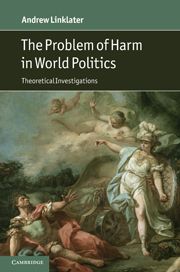Book contents
- Frontmatter
- Contents
- Preface
- Introduction
- 1 The concept of harm
- 2 The harm principle and global ethics
- 3 Harm and international relations theory
- 4 The sociology of civilizing processes
- 5 Historical sociology and world politics: structures, norms and emotions
- 6 Civilizing processes and international systems
- Conclusion
- Bibliography
- Index
1 - The concept of harm
Published online by Cambridge University Press: 05 June 2012
- Frontmatter
- Contents
- Preface
- Introduction
- 1 The concept of harm
- 2 The harm principle and global ethics
- 3 Harm and international relations theory
- 4 The sociology of civilizing processes
- 5 Historical sociology and world politics: structures, norms and emotions
- 6 Civilizing processes and international systems
- Conclusion
- Bibliography
- Index
Summary
All approaches to world politics stress the impact that violent harm has had on the history of relations between states; all recognize the growing influence of non-violent harm in the shape of global environmental degradation or trade policies that disadvantage vulnerable producers. Despite the prevalence of harm, and the various ways in which humans harm and are harmed by others, there has been no attempt to construct a taxonomy of harms in the field. There are compelling normative and empirical reasons for remedying that state of affairs. The quest for a more just world order requires an inventory of the forms of harm that should be eradicated but, for the resources for undertaking that task, one must look beyond International Relations. Turning to works on moral and legal philosophy, this chapter analyses the concept of harm, constructs a classification of the main forms of harm in society and analyses parallels in world politics. But as a prior step, the introductory comments on harm conventions must be taken further, first with respect to intra-group, and then with regard to inter-group, relations.
Harm conventions
No society – not even the most cruel or violent – can survive unless most people internalize the principle that they should not inflict unnecessary harm on other members. Elementary socialization processes that equip infants with an awareness of how their actions can harm other persons as independent centres of experience exist in all societies.
Information
- Type
- Chapter
- Information
- The Problem of Harm in World PoliticsTheoretical Investigations, pp. 29 - 75Publisher: Cambridge University PressPrint publication year: 2011
